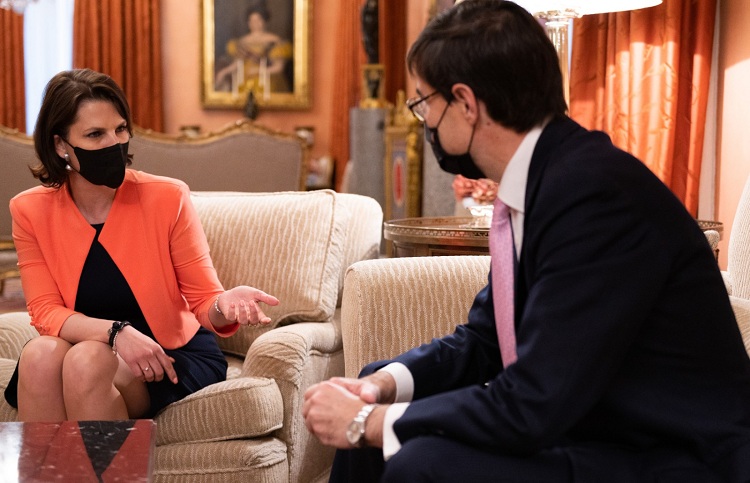Eduardo González
The State Secretary for the EU, Juan González-Barba, and the Austrian Federal Minister for the EU and the Constitution, Karoline Edtstadler, discussed yesterday in Madrid several issues of the common European agenda, with special attention to the health certificate, the enlargement of the EU in the Western Balkans and the differences between the two governments regarding the European migration policy and the agreement with Mercosur.
“The collaboration between Spain and Austria is excellent and meetings like this one are important for the friendship between our countries”, declared Karoline Edtstadler, in correct Spanish, during the press conference following the meeting, held at the ministerial headquarters of the Palacio de Viana, in Madrid.
During the meeting, the two deputy ministers discussed issues such as the green transition, post-pandemic recovery plans, the fight against COVID in the two countries, support for the European vaccination strategy and the defense of the digital green certificate, an objective in which Austria and Spain have been involved almost from the beginning. “She was among the first to advocate in the General Affairs Council for the creation of the digital certificate”, said González-Barba.
Likewise, the State Secretary and his Austrian counterpart confirmed their support for the progress of negotiations with Albania and North Macedonia and for the enlargement of the EU towards the Western Balkans. “Spain does not have the geographical immediacy with that region that Austria has, but, from its European vocation, for Spain the European project is impossible without the successful incorporation of the Western Balkans”, stated González-Barba. “The Western Balkans must be part of Europe, which would not be an enlargement, but the closing of a historical loophole”, said Edtstadler. This region, he said, is “key” to addressing issues such as migration or the influence of Russia, Turkey and China, so “the time has come to stop making empty promises, to be credible and to go a step further”, she warned.
Migrations and Mercosur
Together with these coincidences, the two Vice Ministers addressed two issues on which they openly differ, such as migration policy and the signing of the agreement with Mercosur. Regarding the migration issue, González-Barba declared that “the proposal that the Commission has put on the table does not strike the right balance between the principles of solidarity and responsibility in the border procedure and lacks ambition in terms of solidarity”. For her part, Edtstadler explained that “each country has its own track record and experience and between 2015 and 2016 Austria withstood the main onslaught on the influx of migrants”. “For us it is important to take into account the external dimension, external aid and return procedures”, she continued. In any case, “Austria does not want refugees to be spread all over Europe, we have already taken on a very large share in recent years”, she added.
The new asylum and migration agreement, presented last September by the European Commission, does not satisfy Spain’s position in favor of a mandatory quota system for the distribution of refugees and is limited to establishing a “flexible and voluntary” method for the “equitable sharing of responsibility and solidarity”. Hungary, Poland and Austria have also been highly critical of the agreement, although for different reasons than Spain. Austrian Chancellor Sebastian Kurz has called on the EU to strengthen its borders and has rejected the term “solidarity” to refer to the asylum issue.
As for the agreement with Mercosur, the State Secretary admitted that “there are differences within the EU over the environmental ambition of the agreement and there are reservations, especially in the agricultural sector in general”, but Spain believes that “even in strictly agricultural trade the balance is favorable to the EU” and that the agreement “already includes concrete commitments on the environment and the Commission is willing to make new commitments without the need to reopen the agreement”. For her part, the Austrian Federal Minister warned that, “as it stands, Austria cannot accept it”. Apart from that, she added, “there is a mandate from Parliament and we are bound by that mandate”. “We all agree that we have to make a green transformation in Europe, but this must necessarily be replicated in the agreement with Mercosur”, she said.
Last March, Austria reaffirmed its veto to the trade agreement between the EU and Mercosur, signed in mid-2019, and asked the Portuguese presidency to prevent any attempt to bring it into force. The Austrian Parliament has also rejected the agreement, considering (as well as other EU countries, such as France, Belgium and the Netherlands) that it does not guarantee environmental protection in Brazil. The entry into force of the agreement requires the approval of all 27 EU member states and the European Parliament.







